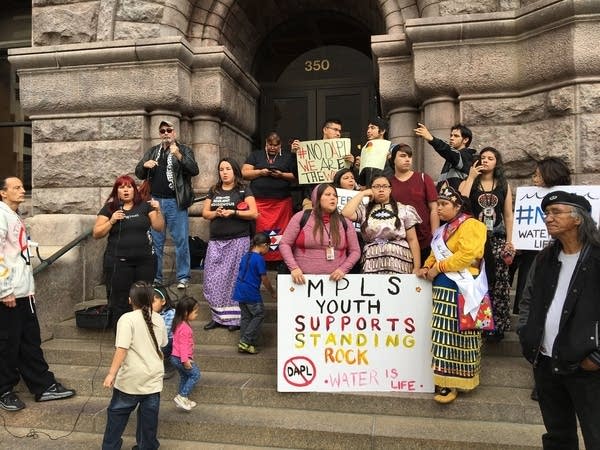Minnesota sheriffs defend giving help to police at Standing Rock

Updated: 6:52 p.m. | Posted: 4:40 p.m.
Sheriffs from three Minnesota counties that responded to a request for help from North Dakota are defending their decisions to send deputies to the Dakota Access Pipeline protests.
Hennepin County Sheriff Rich Stanek, Anoka County Sheriff James Stuart and Washington County Sheriff William Hutton said Tuesday that their decisions were not based on whether the pipeline is a good or bad idea.
Create a More Connected Minnesota
MPR News is your trusted resource for the news you need. With your support, MPR News brings accessible, courageous journalism and authentic conversation to everyone - free of paywalls and barriers. Your gift makes a difference.
Stanek says the local sheriff's office needed help, because it lacked the resources to handle the thousands of protesters gathered there.

"Public safety should never be partisan; should never be political," Stanek said. "When we respond to a call, we don't ask about political views, or like I said earlier, which way those winds are blowing."
In total, there were 40 deputies from Minnesota at Standing Rock — 29 from Hennepin County, six from Anoka County and five from Washington County.
Stanek says members of the Minnesota contingency made up to 10 arrests at the protest site.
The sheriffs' authority to send deputies and intervene in the Standing Rock protest came from a 20-year-old federal agreement called the Emergency Management Assistance Compact, or EMAC, which allows states to get help from other states when local resources are overwhelmed by natural or man-made disasters.
Hennepin County sheriff's deputies have also been sent to help after Hurricane Katrina in 2005 and the Red River flooding in North Dakota in 2009, Stanek said.
North Dakota's governor declared a state of emergency because of the protests in August.
Last week, more than 200 people protested outside Stanek's office decrying his decision to send the deputies.
Some state lawmakers also said it was inappropriate for Stanek to send staff and equipment to the protest.
Rep. Peggy Flanagan, DFL-St. Louis Park, said she felt like this was harmful to relations between the sheriff's office and the Native community.
Stanek on Tuesday addressed those concerns, saying he has reached out to Native American leaders. The sheriff also said he believes some concerns about the deputies' involvement were amplified by media and social media.
Costs for the Minnesota counties' assistance is unclear at this point, but North Dakota officials said the state would pay for associated costs.